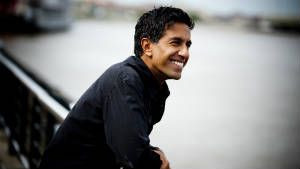Sanjay Gupta Changes His Mind On Marijuana, Apologizes And Says He ‘Didn’t Look Deep Enough’ Into Weed’s Benefits [VIDEO]

Dr. Sanjay Gupta, CNN’s medical correspondent and a longtime marijuana opponent, says he has reversed his opinion on the potential benefits of the substance and now considers it a safe and effective alternative to many prescription drugs.
Gupta wrote an op-ed for CNN on Thursday entitled, “Why I changed my mind on weed,” where he apologized for his once-hardline stance on the drug, pointing to a 2009 TIME article called “Why I Would Vote No On Pot.” Gupta says he didn’t look hard enough, that the evidence for pot’s medical benefits are not obvious particularly because the funding for its research pales in comparison to legal prescription drugs.
“I apologize because I didn't look hard enough,” he wrote, “until now. I didn't look far enough. I didn't review papers from smaller labs in other countries doing some remarkable research, and I was too dismissive of the loud chorus of legitimate patients whose symptoms improved on cannabis.”
For the last year, Gupta has been working on a documentary called Weed. The film highlights the relative unknowns of the marijuana world, from growers to sellers to the clinical trials taking place in foreign countries, which, if not for Gupta’s sleuthing efforts, probably would have remained outside the limelight.
Gupta says he met countless people for whom marijuana helped them overcome debilitating conditions, and who continuously chipped away at his hard, skeptical exterior.
“Take the case of Charlotte Figi, who I met in Colorado,” the op-ed reads. “She started having seizures soon after birth. By age 3, she was having 300 a week, despite being on seven different medications. Medical marijuana has calmed her brain, limiting her seizures to 2 or 3 per month.”
Gupta explains that providing the best care to people like Charlotte sometimes means medicating with marijuana’s help. The country has been misled for 70 years, he continues, “and I apologize for my own role in that.”
Medical Marijuana Debate Rages On
Despite legalization for medicinal use in 20 states including D.C., marijuana is still considered a schedule 1 substance. Gupta is critical of this classification, arguing that the drug’s low-addiction rate make it an entirely safer substance than statistically more potent drugs that come with less severe punishments.
“We now know that while estimates vary, marijuana leads to dependence in around 9 to 10 percent of its adult users,” he noted, referring to a 1944 report commissioned by then New York City mayor Fiorello LaGuardia. “By comparison, cocaine, a schedule 2 substance ‘with less abuse potential than schedule 2 drugs’ hooks 20 percent of those who use it. Around 25 percent of heroin users become addicted.”
Gupta acknowledges the toll marijuana use can take on developing brains. He says he’ll urge his own children to wait until their mid-20s before trying the substance, when their brains have fully formed. Over the course of filming his documentary, he reports, he tried weed for the first time. He said the experience made him “anxious,” and that it was mostly “unpleasant.”
For others, however, the doctor has directed much of his efforts toward separating fact from fiction. Prescription drugs are not always the safest alternative, he notes. In filming Weed, he saw zero overdoses from marijuana. Every 19 minutes, by comparison, someone OD’s on prescription drugs.
Gupta says that, going forward, he hopes to lean on less well-known studies, such as those from Spain or Israel, to comprise a more robust knowledge base.
“I'm intrigued by the neuro-protective study by Lev Meschoulam in Israel, and research in Israel and the United States on whether the drug might help alleviate symptoms of PTSD,” he noted. “I promise to do my part to help, genuinely and honestly, fill the remaining void in our knowledge."



























